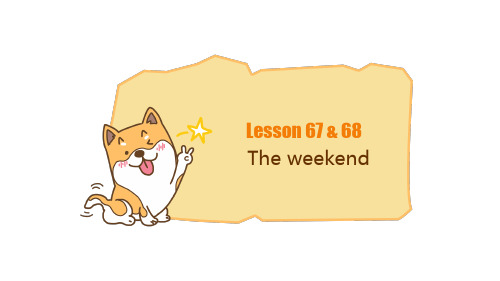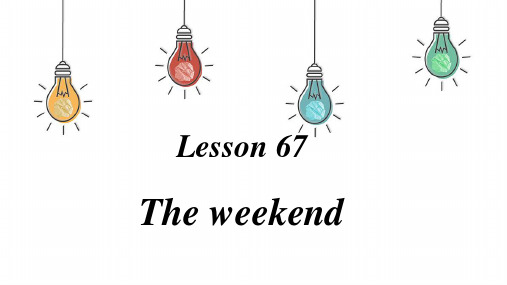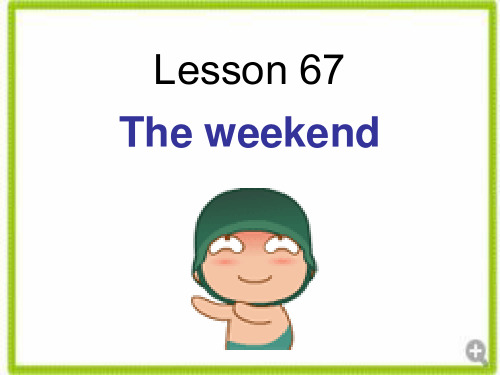新概念英语第一册lesson67theweekend
新概念一册Lesson 67The weekend

am,are的过去式是were is的过去式was
were的否定weren’t
was 的否定 wasn’t
How
is Jimmy today? How are you? How is she/he? How are they?
How are you all keeping?问人怎么 样? 也可以说How are you doing? How is everything/it going? What’s going on? 那一般我们都怎么回答呢?
What is the date today?
Lesson 67 The weekend
Everyday English
1.
I want to change my life. 我想改变我的生活。
3. Love at first sight. 一见钟情。 4. I’m not that good! 我没有这么好。
1.How is Jimmy today?
He’s very well.
2.Was Jimmy at school last week?
No, he wasn’t.
3.When was he absent from school?
1.Was Jimmy absent from school ? 2.What day was Jimmy absent from school ? 3. Where and when are Mrs. Johnson going to spend there weekend?
spend的过去式spent花费,主语为人,一般与in/on .搭配。
spend,与cost 的区别
都是花费的意思,spend的主语是人,cost主
新概念英语一Lesson 67

Lesson 68 what’s the time ?
New Words at church 在教堂 at the dairy 在乳品店 at the baker’s 在面包店 at the grocer’s 在食品杂货店
time
1. 分钟数﹤30 几点过几分 past 7:05 five past seven 3:10 ten past three 2.分钟数﹥30 差几分几点
to
3:55 five to four 9:50 ten to ten
Lesson 67 The weekend
1.greengrocer
at the greengrocer’s 在蔬菜水果店
New Words 2.absent 缺席的 be absent from school 没上学 be absent from work 没去上班
New Words
3. spend v. 度过 ① v. 花(时间等);度过 . 我打算去北京过一周。 I’m going to spend a week in Beijing. ② v. 用(钱),花费 spend 金钱 + on +sth. Women spend a lot of money on clothes.
一般过去时表示过去发生的而现在已 经结束的动作。 系动词be(am, is, are)的过去式有 两种: am, is的过去式是was are的过去式were 主语为第一、三人称单数时用was; 其他人称用were。 否定形式分别为wasn’t, weren’t
一般过去时 含有系动词be的句型
主语为第一、三人称单数时用was (I, he, she, it) 1. I was at home yesterday. 2. I wasn’t at home yesterday. 3. Were you at home yesterday? --Yes, I was. --No, I wasn’t.
Lesson 67-68 The weekend(课件)-新概念英语第一册

be动词的过去式
主语/时态 第一人称单数(I) 第三人称单数 (He, She, It)
现在时 am is
过去时 was
at the greengrocer’s
baker
/ˈbeɪkə/ n.
at the baker’s
at the greengrocer's (shop) at the grocer's at the hairdresser's
在蔬菜水果店 在杂货店 在理发店
at the doctor's (office) at my mother's (house)
Tuesday Friday weekend country baker grocer
Wednesday Saturday spend church keep greengrocer
Which one is appearing?
Saturday
absent country
weekend
greengrocer
Where were you on March 3rd? I was at...
Where were you on April 4th? I was...
Where were you on May 5th? I ...
Where was she on June 6th? She was at...
Friday /ˈfraɪdeɪ/
Saturday /ˈsætədeɪ/ Sunday /ˈsʌndeɪ/ weekend /ˌwiːkˈend/
新概念英语67课讲义资料讲解

新概念英语67课讲义Lesson 67 the weekend 周末一、单词与短语greengrocer: n.蔬菜水果零售商;absent:adj.缺席的,重要短语:be absent from:缺席、、、、He was absent from school last week.上周他没上学。
keep: v.(身体健康)处于(状况),保持、、、keep doing sth:一直做、、、或者是不停地做、、、、;keep knocking the door:一直敲门;spend:v.度过;spend a weekend:度周末;weekend:v.周末;country:n.国家;乡村;lucky: adj.幸运的;luck:n.幸运,机遇。
Monday:n,星期一;Tuesday:n.星期二;Wednesday:n.星期三;Thursday:n.星期四;Friday: n.星期五;Saturday: n.星期六;Sunday: n.星期日;在星期几前边一般加介词on,如:on Monday:在周一;On Sunday:在周日;二、短语、句型与语法1、Were you at the butcher′s?刚才您在肉店里吗?Yes, I was. 是的,我在。
在本句中,需要注意的一个知识点:在英文表示某一种商店的短语中,shop这个词往往可以省略,如文中的the butcher′s 其实就是the butcher′s shop的省略,另外像文中的the greengrocer′s 其实就是 the greengrocer′s shop 的省略,另外的例子还有the hairdresse r′s (shop )等等,shop 的省略不影响句义,就是一种表达的习惯。
2、how is jimmy today?吉米今天怎么样?在本句中我们继续复习关于询问人或事物状况的几个重要的句型:How is/are+主语、、、怎么样?例:How are you today?你今天可好?How is Tom today?汤姆今天可好?另外What is the matter with、、、?经常用来询问人和事物的状况,常作“是否有问题”“是否有麻烦讲”例如:What is the matter with Tom?汤姆怎么了啊?What is the matter with this bike?这辆自行车怎么了啊?What is the matter with the book?这本书怎么了?3、Was he absent from school last week?上周他没上学吧?在本句中需要掌握一个重点短语的用法:be absent from:缺席、、、例:He is absent from the meeting since he is ill.他今天缺席会议是因为他病了。
新概念Lesson-67-----The-weekend上课讲义

参加晚会。 反义词:present 出席,参加 Every employee must be present at the
meeting.每一位员工必须出席这个会议。
星期的表达
Monday Tuesday Wednesday Thursday Friday Saturday Sunday
weekday n. 平日(常指周一到周五的日子)
eg. My father is always busy in weekdays. 我爸爸平日总是很忙。
country
n. 乡村
country 1) n. 乡村,乡下 注意:country 当 “乡村,乡下”讲的时候,
前面必须用定冠词“the”;也可以说the countryside。
夫妇俩)
Now listen!
MRS.JOHNSON: Hello. Were you at the butcher’s?
MRS.WILLIAMS: Yes. I was. Were you at butcher’s, too?
MRS.JOHNSON: No, I wasn’t. I was at the greengrocer's. How's Jimmy today?
新概念英语 第一册
Hello! Everyone! I am Shannon.
Lesson 67 Tre you going to do at the weekend?
New Words and expressions 生词和短语
greengrocer absent Monday Tuesday Wednesday Thursday Keep
新概念英语第一册lesson67Theweekend

周末的重要性
放松身心:周末是放松身心的好时机,可以缓解工作压力和疲劳 家庭时光:周末是与家人共度时光的好机会,可以增进亲情和家庭关系 个人兴趣:周末可以用来追求个人兴趣和爱好,提升自己的技能和知识水平 社交活动:周末可以参加各种社交活动,结交新朋友,拓展人际关系
听录音模仿发 音和语调
练习听力和口 语表达
学习资源推荐
教材:新概念英语第一册lesson67Theweekend 视频教程:B站上有相关的教学视频,可以跟着老师学习 学习软件:扇贝单词、百词斩等APP上有新概念英语的单词和课文,可以随时随地学习 学习网站:新东方在线、沪江网校等网站上有新概念英语的教学课程,可以系统地学习
旅游观光:利用周末时间游览景点,了解当地文化,增强跨文化交流能力。
周末活动的实践案例分享
周末英语角:参加英语角活动,与母语人士交流,提高口语水平 英文电影赏析:观看适合英语初学者的英文电影,提高听力和语感 英语歌曲学习:学习简单的英文歌曲,培养英语学习兴趣 英语阅读:阅读适合英语初学者的英文故事或短篇小说,提高阅读能力
课文中的重点词汇和表达
重点词汇:周 末、公园、散 步、早晨、晚 上、享受、音 乐会、演奏、
钢琴、独奏
重点表达:在 公园散步,度 过一个愉快的 早晨和晚上; 参加音乐会, 欣赏演奏;形 容音乐会的气
氛和感受。
课文中的语法点
情态动词:本 课介绍了情态 动词"can"的用 法,表示能力
或可能性。
现在进行时: 课文中使用了 现在进行时, 表示正在进行 的动作或状态。
周末活动的种类
休闲娱乐活动: 看电影、听音乐、 玩游戏等
新概念英语第一册第67课

• I spent 10 yuan on the book./(in) buying the book. • I didn't spend 10 yuan on the book./(in) buying the book. • Did you spend 10 yuan on the book./(in) buying the book? • Yes,I did. No, I didn't. • How much did you spend on the book./(in) buying the book?
我花了10元买那本书。
他花了一个小时打篮球。
• He spent an hour (in) playing basketball. • He didn't spend an hour (in) playing basketball. • Did he spend an hour (in) playing basketball? • Yes, he did. No, he didn't. • How long did he spend (in) playing basketball?
15 15
一般过去时的否定
They played in the garden on Sunday.
They did not play in the garden on Sunday.
Tom watched TV this morning.
Tom did not watch TV this morning.
18 18
一般过去时练习
我们在图书馆说话了。
She talked in the library.
新概念英语第一册-L67-the-weekend专题市公开课获奖课件省名师示范课获奖课件

一般目前时
❖ We are doing our housework now.
❖
正在
❖ The bus is leaving at 8:00.
进行
❖
时
❖ 主语+ be动词(was,were)+其他 ❖ 主语 + 实意动词旳过去式形式+其他 ❖ (实意动词:有确切含义旳动词,能够单独做谓语,
如:played等)
morning
yesterday afternoon
evening
the day before yesterday
4.与one 连用: morning evening
one day
Monday afternoon
5.与that 连用:
that
morning winter day year
6.其他时间状语:
Children spend a lot of time on Internet. 孩子 们花费诸多时间上网。
spend 时间/金钱 +(in) doing sth.
The manager spent 2 hours(in) explaining the plan at the meeting. 在会上,经理用两个小时来解释这个计划
他在城里住了将近三十年,可还是土气十足。
★ lucky adj. 幸运旳
[ˈlʌki] ① adj. 有好运旳,幸运旳
She was lucky to get such a well-paid job. 她能得到这么一种酬劳优厚旳工作真幸运。
② adj. 侥幸旳,恰巧旳
He didn’t really know the answer - it was just a lucky guess.
新概念英语第一册Lesson6768Theweekend小学英语初中英语全国通用

[ˈdeəri]
Vocabulary
词汇精讲
baker
n. 面包师傅
[ei]
A baker is a person whose job is to bake and sell bread, and cakes.
— When was he / Tom at the hairdresser's? — He was at the hairdresser's on Wednesday.
Language Point
语句讲解、课文讲解
同学们 , 请对照教材听老师讲解!
absent : adj. 缺席的,不在的 没去上学 : sb. is absent from school.
Vocabulary
词汇精讲
weekend
n. 周末
weekend : 周末 (rest) ↔ weekdays : 工作日(work) e.g. How do you spend your weekend?
你周末时间怎么打发?
spend : v. 花费(时间 , 金钱) How about going shopping this weekend? 这周末一起去逛街购物怎么样?
介词at + 定冠词the + 表示职业 , 身份的人's (所有格)
Language Point
语句讲解、课文讲解
表示地点 , 有些需要用定冠词the,有些不需要。 e.g. at the office : 在办公室
in the country : 在乡下 at the butcher's : 在肉店
新概念英语第一册L67-68教案

新概念英语第一册L67-68教案LT星概念lesson67-68 The weekend教案教学内容:1.W ords:baker ,church, weekend, dairy ,grocer ,absent,absent from school, keep,last week ,lucky ,2.一般过去时教学目标:1.Try as far as possible to conduct the lesson in English.2.Was and Were are introduced in this lesson together with days of the week.It may be necessary to translate some of the vocabulary in the dialogue.教学重难点:1.Words:at the greengrocer’s,country,Friday,greengrocer,in the country , Monday ,Saturday,spend Sunday ,Thursday ,Tuesday, Wednesday 2.sentences:Were you (at the butcher's)?Yes, I/he/she was.No, I/he/she wasn't.Where were you (on Monday)?I was(at church on Sunday/ January 1st).It's(five past/ to one).3.一般过去时教学步骤:Step1. Greeting and warming upStep2 Review 检查课文背诵相关作业的口头提问Step3 New words1.spend v.(1)花(时间等);度过:spend +n./pron我们要在我妈妈家呆几天。
Lesson 67 The weekend(课件)新概念英语第一册

• 2.他上周没去上学吗? • Was he absent from school last week? • 3.How are you (all) keeping? • =How are you. • 4.I am going to spend three days in the country. • 【一般将来时:主语+be going to +V.原】 • 5.Aren't you lucky!【否定疑问句 用来强调】
n.蔬菜水果零售商 a.缺席的 v.处于...状况 v.度过 n .乡村 a.幸运的
• greengrocer • absent • Monday • Tuesday • Wednesday • Thursday • keep • spend • weekend • Friday • Saturday • Sunday • country • lucky
Lesson 67
The weekend
greengrocaebrsent Monday
Monday
TuesdayWednesdaTyhursday
TWuhedeunrsesdsddaaayy
kweeepkendspend
Friday Saturday Sunday
SaFStruuindrdadayayy
补全课文(七选五)A: Hello! Were you at the butcher's? B: ①___________________________ Were you at the butcher's
too?A: No, I wasn't. I was at the greengrocer's. How is Jimmy today?B: ②___________________________A: Was he absent from school last week?B: ③___________________________ He was
新概念一册 lesson67

语言点
• 疑问句:be 动词过去式提前并大写 原大写字母小写 后面顺序不变照抄 句号变问号 • 例句:他以前是个好孩子么? Was he a good boy? • 回答: Yes,he was. No,he wasn’t .
新概念一册 Class A&B
Lesson67 The weekend
词汇
• Greengrocer 菜市场
食杂店,杂货铺 卖绿色产品的地方,因此是蔬菜水果市场
词汇
• A场) Ab- 否定前缀,一般表示“不” Sent 有“送”的意思 不送了,所以就不来了,就是缺席
词汇
• 周一 Monday • 周二 Tuesday • 周三 Wednesday • 周四 Thursday • 周五 Friday • 周六 Saturday • 周日 Sunday
on
词汇
补充: • Weekday 工作日 • Weekend 周末
词汇
• Keep v. 1. 处于……状态 keep warm 保持温暖 2. 保存,养 keep a dog 养小狗 用法:keep + 物品 保管好,保存好……东 西 keep + doing 保持……动作
词汇
• Lucky a.幸运的,侥幸的 Lucky dog 幸运儿 Lucky! 太幸运了! Good luck! 祝你好运。
语言点
• 一般过去时 表示过去发生的事
过去时 将来时
最重要特征: 动词发生变化 is was be动词 am was are were 现在是 以前是
新概念英语第一册第67课

一般过去时
• 一般过去时(simple past tense)表示过去 某个时间里发生的动作或存在的状态,常 和表示过去的时间状语连用,如yesterday, last night,in 1990,two days ago等。 • 一般过去时也表示过去经常或反复发生的 动作,常和often,always等表式频率的时 间状语连用。
一般现在时
一般过去时
is , am are
→ →
was were
一般过去时结构
含有be动词(过去的状态)
肯:主语+was/were +其他. 否:主语+wasn’t/weren’t +其他. 疑:Was/Were +主语+ 其他? 答:Yes,主语+was/were. No, 主语+wasn’t / weren’t.
absent adj. 缺席的
• • • • • be absent from 上星期她没去上学吧? Was she absent from school? 我昨天没上班。 I was absent from work yesterday.
keep
v.
身体处于…状态,保持
• How are you all keeping? • How is your mother keeping? • Please keep the door open.
规则变化的动词过去式
1 直接加ed: work—worked look—looked 2 以不发音e结尾的单词,直接加d: live —lived use—used, 3 以辅音字母+y结尾的,变y为i加ed: study— studied carry—carried 4以元音字母+y结尾的,直接加ed: enjoy —enjoyed play—played 5 以重读闭音节结尾的,双写+ed: stop— stopped plan—planned
- 1、下载文档前请自行甄别文档内容的完整性,平台不提供额外的编辑、内容补充、找答案等附加服务。
- 2、"仅部分预览"的文档,不可在线预览部分如存在完整性等问题,可反馈申请退款(可完整预览的文档不适用该条件!)。
- 3、如文档侵犯您的权益,请联系客服反馈,我们会尽快为您处理(人工客服工作时间:9:00-18:30)。
MRS JOHNSON: Hullo, Mrs Williams. Were you at the butcher's?
MRS WILLIAMS: Yes. I was. Were you at the butcher’s ,too?
MRS JOHNSON: No, I wasn’t. I was at the greengrocer’s. How’s Jimmy today?
MRS WILLIAMS: He’s very well, thank you.
MRS JOHNSON: Was he absent from school last week?
MRS WILLIAMS: Yes, he was. He was absent on Monday, Tuesday, Wednesday
and Thursday. How are you all keeping?(你们身体怎么样?)MRS JOHNSON: Very well, thank you. We’re going to spend three days in the
country. We’re going to stay at my mother’s for the
week-end.
MRS WILLIAMS: Friday, Saturday and Sunday in the country! Aren’t you lucky!
New Word and expressions 生词与短语
greengrocer
n. 蔬菜水果零售商
absent
adj. 缺席的
Monday
n. 星期一
Tuesday
n. 星期二
Wednesday
n. 星期三
Thursday
n. 星期四
keep
v. (身体健康)处于(状况)
spend
v. 度过
weekend
n. 周末
Friday
n. 星期五
Saturday
n. 星期六
Sunday
n. 星期日
country
n. 乡村
lucky
adj. 幸运的
本文参考译文
约翰逊夫人:您好。
刚才您在肉店里吗?威廉斯夫人:是的,我在肉店里。
您也在肉店里吗?
约翰逊夫人:不,我不是。
我在蔬菜水果店里。
吉米今天怎么样?
威廉斯夫人:他很好,谢谢您。
约翰逊夫人:上星期他没上学吧?
威廉斯夫人:是的,他没上学。
他星期一、星期二、星期三和星期四没
去上学。
你们身体都好吗?
约翰逊夫人:很好,谢谢您。
我们打算到
乡下去三天,在我母亲家度
周末。
威廉斯夫人:星期五、星期六和星期日在乡下
过!你们真幸运啊!
【课文】
MRS.JOHNSON: Hello. Were you at the butcher's?
MRS.WILLIAMS:Yes. I was. Were you at butcher's, too?
MRS.JOHNSON: No, I wasn't. I was at the greengrocer's. How's Jimmy today?
MRS.WILLIAMS:He's very well, thank you.
MRS.JOHNSON: Was he absent from school last week?
MRS.WILLIAMS:Yes, he was. He was absent on Monday, Tuesday, Wednesday and Thursday. How are you all keeping?
MRS.JOHNSON: Very well, thank you. We're going to spend three days in the country. We're going to stay at my mother's for the weekend.
MRS.WILLIAMS:Friday, Saturday and Sunday in the country! Aren't you lucky!
【课文翻译】
约翰逊夫人:您好。
刚才您在肉店里吗?
威廉斯夫人:是的,我在肉店里。
您也在肉店里吗?
约翰逊夫人:不,我不是。
我在蔬菜水果店里。
吉米今天怎么样?
威廉斯夫人:他很好,谢谢您。
约翰逊夫人:上星期他没上学吧?
威廉斯夫人:是的,他没上学。
他星期一、星期二、星期三和星期四没去上学。
你们身体都好吗?
约翰逊夫人:很好,谢谢您。
我们打算到乡下去三天,在我母亲家度周末。
威廉斯夫人:星期五、星期六和星期日在乡下过!你们真幸运啊!
【生词】
greengrocer n. 蔬菜水果零售商
absent adj. 缺席的
Monday n. 星期一
Tuesday n. 星期二
Wednesday n. 星期三
Thursday n. 星期四
keep v. (身体健康)处于(状况)
spend v. 度过
weekend n. 周末
Friday n. 星期五
Saturday n. 星期六
Sunday n. 星期日
country n. 乡村
lucky adj. 幸运的
【知识点讲解】
1. 之前我们已经陆续学习了月份、季节的表达,现在我们要来学习星期的7种说法。
要记得在书写月份和星期名字的时候首字母都要大写哦!努力把这7个单词记下吧,很重要的!
2. 周末的表达是weekend,我们可以看到它是有week + end 组成的,正好对应了汉语里的“周+末”的意思,这样是不是好记了?另外“工作日”的表达是:weekday。
3. 今天还要接触一点过去式的表达。
在英语当中,发生在过去而现在已经结束的事必须用过去时态来表达。
本节课里讲到了be动词的过去式was和were,它们对应的现在时分别是am或is,和are。
我们来看看文中的句子转换成现在时的对比:
Were you at the butcher's —— Are you at the butcher's
Yes, I was. —— Yes, I am.
No, I wasn't. —— No, I'm not.
要记得第一、第三人称单数都用was;其他情况则用were.
4. Aren't you lucky! 这句话是一个感叹句,虽然看起来是否定形式的,但其实表达的是肯定的语气。
意思是“你们多幸运啊!”
来看个例子:
Jimmy: Here's your birthday present!
给你的生日礼物!
Anne: Oh! Aren't you sweet!
哦!你真贴心!
【作业时间】
1. 我们为大家提供了两种主流英语发音的音频,请大家下载自己喜欢的一种,放到MP3里反复听!(刚开始练习英语听力和口语最好选定一种学习,不要英音美音混淆哦!)
2. 背诵、并默写今天的课文。
实在没有时间的同学就抄写一遍吧。
(论坛互动学习本期推出在线录音,希望大家多多开口,我会帮大家做点评)
3. 用今天学到的单词或句型造句一个。
